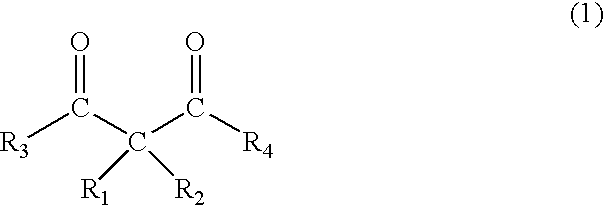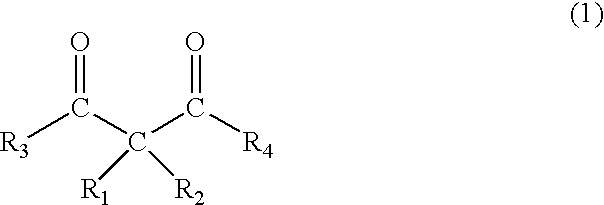Photoinitiator, novel compound, and photocurable composition
a technology of photoinitiators and compounds, applied in the field of photoinitiators, a novel compound, and photocurable compositions, can solve the problems of unresolved yellowing problem, difficult use of photoinitiators for uv curing of coatings having a greater layer thickness, etc., and achieve excellent photosensitivity
- Summary
- Abstract
- Description
- Claims
- Application Information
AI Technical Summary
Benefits of technology
Problems solved by technology
Method used
Image
Examples
example 1
3,3-Dimethyl-2,4-pentandione
[0153]
[0154]50 g of 2,4-pentandione, 178 g of iodo-methane, 120 g of potassium carbonate, and 340 ml of acetone were mixed and heated to reflux for 18 hours. After cooling, 200 ml of petroleum ether was added, and the solid was filtered off and washed with 300 ml of an one-to-one mixture of petroleum ether. Residual 3-methyl-2,4-pentandione was removed by reacting with ethyl acrylate. The raw product was distilled to yield 23 g of 3,3-dimethyl-2,4-pentandione (boiling point: 63° C. / 20 mbar; purity: >99%; colorless).
[0155]Content of the active structural element C3O2: 54%.
example 2
3,3-Diethyl-2,4-pentandione
[0156]
[0157]25 g of 2,4-pentandione, 98.3 g of bromo-ethane, 80 g of potassium carbonate, and 175 ml of acetone were mixed and refluxed for 39.5 hours. The solid was filtered off and washed with petroleum ether and acetone. To the liquid layer, 2.0 g of 1,8-diazabicyclo-[5.4.0]-undec-7-ene was added and the mixture was refluxed for two days. After addition of an additional 11.6 g of 1,8-diazabicyclo-[5.4.0]-undec-7-ene and refluxing for seven hours, 25 g of ethyl acrylate was added and the mixture was stirred at room temperature, and the solvent was distilled off and the mixture was refluxed for 8 hours. The base was neutralized by adding acetic acid, washed with an aqueous potassium carbonate solution, and extracted with diethyl ether. The ether layer was dried and the product was isolated by fractional distillation to yield 9 g of product (boiling point 190° C. / 1000 mbar; purity: 75%; colorless).
[0158]Content of the active structural element C3O2: 44%.
example 3
3-Acetyl-3-methyl-4-oxo-pentanoic acid ethyl ester
[0159]
[0160]28 g of potassium hydroxide dissolved in 28 ml of water was added to a mixture of 50 g of 2,4-pentandione, and 100 ml and 115 ml of dioxane at 0 to 10° C. After 20 minutes of stirring, 125 g of bromoacetic acid ethyl ester was added dropwise and the mixture was stirred for 19 hours. The layers were separated and washed with water and diethyl ether. The organic layer was dried and 3-acetyl-4-oxo-pentanoic acid ethyl ester was isolated by fractional distillation.
[0161]48.3 g of 3-acetyl-4-oxo-pentanoic acid ethyl ester, 41 g of iodo-methane, 34 g of potassium carbonate, and 90 ml of acetone were mixed and refluxed for 9 hours. After cooling, 100 ml of petroleum ether was added, and the solid was filtered off and washed with acetone and petroleum ether. Fractional distillation yielded 33.4 g of 3-acetyl-3-methyl-4-oxo-pentanoic acid ethyl ester (boiling point: 69° C. / 0.02 mbar; purity: 97%; colorless).
[0162]Content of the ac...
PUM
| Property | Measurement | Unit |
|---|---|---|
| carbon number | aaaaa | aaaaa |
| carbon number | aaaaa | aaaaa |
| weight percent | aaaaa | aaaaa |
Abstract
Description
Claims
Application Information
 Login to View More
Login to View More - R&D
- Intellectual Property
- Life Sciences
- Materials
- Tech Scout
- Unparalleled Data Quality
- Higher Quality Content
- 60% Fewer Hallucinations
Browse by: Latest US Patents, China's latest patents, Technical Efficacy Thesaurus, Application Domain, Technology Topic, Popular Technical Reports.
© 2025 PatSnap. All rights reserved.Legal|Privacy policy|Modern Slavery Act Transparency Statement|Sitemap|About US| Contact US: help@patsnap.com



